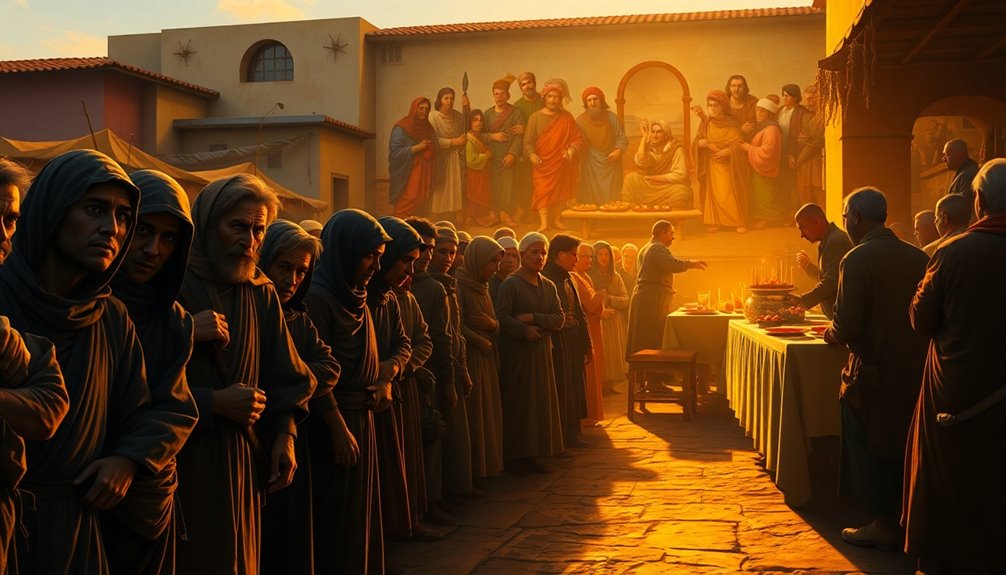"The last shall be first" emphasizes that spiritual worth isn't tied to earthly status. When you embrace humility and service, you can experience God's grace, much like the least regarded receiving special honor. This idea challenges traditional hierarchies, suggesting that those marginalized in society can find value and dignity in God's eyes. It highlights the importance of community, compassion, and genuine relationships over status or wealth. Instead of competing for recognition, focus on serving others. There's more to uncover about how this principle applies today and the impact it has on our understanding of fairness and grace.
Key Takeaways
- "The last shall be first" emphasizes God's grace, valuing humility and service over worldly status and merit.
- This phrase reflects the idea that true worth is determined by faith and genuine service, not by lineage or labor duration.
- It challenges social hierarchies, advocating for the marginalized and highlighting the importance of community and compassion.
- The concept encourages believers to focus on spiritual integrity rather than societal recognition and material wealth.
- Key biblical references illustrate that God's generosity is available to all, regardless of their timing or earthly status.
Introduction

Ultimately, the message encourages spiritual equality among believers.
It's not about who's first or last; instead, it's about serving others and embracing the grace that God freely offers, transforming your understanding of worth and reward in His kingdom.
Biblical Context of Parables

When you explore the biblical context of parables, you'll notice how they often carry profound meanings through relatable stories.
The primary references, like the parable of the laborers in the vineyard, highlight God's generosity and grace, while secondary references reinforce the idea that humility and faith are valued in His kingdom.
Understanding these points can deepen your appreciation for the teachings of Jesus and their relevance today.
Primary Bible References
The phrase "the last shall be first" appears in several key Gospel passages, highlighting a recurring theme of divine reversal in the Kingdom of God. You'll find it in Matthew 19:30, Matthew 20:16, Mark 10:31, and Luke 13:30. These references illustrate how God prioritizes humility and faith over worldly status.
In the Parable of the Workers in the Vineyard (Matthew 20:1-16), you see laborers hired at different times receiving equal pay, which emphasizes that grace, not merit, determines access to the Kingdom. This challenges the idea that those considered first in society automatically hold favor with God.
Moreover, in Luke 13:26-30, Jesus critiques the Jewish leaders who believed their heritage made them first, revealing that true faith is what truly matters.
The context of Matthew 19:30, following Jesus' warning about the rich and their difficulty in attaining eternal life, reinforces that earthly wealth doesn't guarantee a place in God's favor.
Ultimately, these passages remind you that in God's Kingdom, the last and the last are often elevated above the first, reflecting a divine order that values the heart over status.
Secondary Bible References
Building on the biblical references that illustrate the theme of divine reversal, the secondary references provide additional context to the parables where the phrase "the last shall be first" appears.
In the Parable of the Workers in the Vineyard (Matthew 20:1-16), you see how God's grace operates outside human expectations. Those who worked only an hour received the same wage as those who labored all day, emphasizing that in God's kingdom, the last shall be first.
In Luke 13:30, Jesus further underscores this idea, indicating that those deemed insignificant by society will find equal standing in the Kingdom of Heaven. This challenges the norms of His time, suggesting a profound reversal of status.
Similarly, Mark 10:31 reinforces this by stating many who are first will be last, highlighting the unpredictability of God's favor.
The Parable of the Great Banquet (Luke 14:15-24) complements these themes, as the humble and marginalized are invited to the feast while the self-righteous are excluded.
Together, these parables reveal that the kingdom of heaven operates on principles of humility and grace, rather than merit.
Social Hierarchy in Ancient Israel

In ancient Israel, social hierarchy was intricately woven into the fabric of daily life, heavily shaped by factors like family lineage, wealth, and religious status. The priestly class and wealthy landowners wielded significant power, reinforcing a rigid class structure.
Prominent religious groups like the Pharisees and Sadducees maintained their social prestige, often marginalizing the common people, including laborers and sinners.
Land ownership was a key determinant of social status, with large estates typically passed down through generations. This practice not only entrenched inequalities but also limited upward mobility for the lower classes.
The Jewish concept of honor and shame played a vital role in social interactions, where individuals faced judgment based on their adherence to religious laws and communal expectations.
However, the expectation of the Messiah hinted at a radical reordering of social hierarchies. Teachings of Jesus emphasized that in the Kingdom of God, the humble and oppressed would be elevated.
This promise of equality challenged the existing social norms, offering hope to those marginalized within the strict social hierarchy of ancient Israel. By prioritizing the last over the first, these teachings aimed to reshape society in profound and transformative ways.
Cultural Implications of Status

Exploring the cultural implications of status reveals how deeply the notion of "the last shall be first" resonates in our society. This phrase challenges the traditional hierarchies that often prioritize the rich over the young and the marginalized.
In today's world, social justice movements invoke this concept to advocate for those deemed "last"—emphasizing their inherent worth and the need for equitable treatment. You might notice how literature and art often depict the triumph of the humble, illustrating that character and service matter more than wealth or power.
As you engage with these themes, you'll see how this principle informs leadership philosophies that promote servant leadership. These models value compassion and community well-being over the conventional measures of success, like profit and influence.
The dialogue around "the last shall be first" encourages discussions on fairness and equity, prompting you to reflect on the moral implications of our social structures. By embracing this perspective, you can contribute to dismantling the societal norms that keep some individuals in the shadows, allowing the young and the underestimated to rise and take their rightful place.
Misunderstanding the Parable's Intent

You might think "the last shall be first" guarantees a social reversal based on earthly status, but that's a common misconception.
This parable actually highlights the importance of humility and faith over material wealth.
Debunk Common Misconceptions
Misunderstanding the phrase "the last shall be first" can lead to significant misconceptions about its true meaning. Many believe it suggests that the poor or marginalized will automatically have higher status in heaven.
However, Jesus told us that this phrase emphasizes humility and service over societal status. Financial wealth doesn't equate to spiritual failure; rather, salvation is rooted in grace through faith, not material possessions.
The parable of the laborers in the vineyard illustrates this concept beautifully. Regardless of when they responded to God's call, all received the same rewards in heaven, highlighting God's grace rather than a strict meritocracy.
Some religious leaders thought their heritage guaranteed them a place in the Kingdom, but Jesus warned that relying on status could leave them last.
Ultimately, the teaching serves as a reminder that God's judgment focuses on the heart and the sacrifices made for the gospel.
You're encouraged to live a life of service and humility, as these qualities matter far more than the superficial measures of success society often values. Embracing this mindset helps align you with the true spirit of the parable.
Counterarguments to the Parable
Many people misconstrue the parable of the vineyard, seeing it as a promotion of laziness rather than an illustration of God's boundless grace. Critics often argue that the story undermines hard work, but in reality, it emphasizes that salvation and rewards stem from God's mercy, not simply human effort.
When you view the parable through a worldly lens, you might miss the spiritual principle that God's kingdom operates on grace, where the first can become last.
Some may feel jealous of the grace shown to those who worked fewer hours, interpreting this as unfair. However, this perspective overlooks the essence of divine justice.
The parable teaches that true belief and service matter far more than the duration of one's labor. It's not about guaranteeing rewards for everyone; it's about recognizing that God's ways transcend our understanding of merit and reward.
Ultimately, the parable invites you to reflect on your own relationship with grace. It challenges you to embrace the idea that God's generosity is available to all, regardless of when they come to Him, reinforcing that divine justice isn't limited by human standards.
Serving the Marginalized Today

You can make a real difference by serving the underprivileged in your community.
Engaging in outreach initiatives not only uplifts marginalized individuals but also strengthens the fabric of society as a whole.
Serving the Underprivileged Today
In today's society, serving the underprivileged means actively confronting systemic inequalities that create barriers to essential resources like education and healthcare.
As you engage in this important work, remember that serving God often involves uplifting those who struggle with the harsh realities of a life of poverty.
Consider the young man who dreams of entering the kingdom of opportunity but finds himself held back by hunger or lack of access to quality education.
Organizations like Feeding America highlight that 1 in 8 Americans face hunger, making food security initiatives crucial. You can help by volunteering or donating to local food banks.
Moreover, advocating for affordable housing is vital.
With millions of low-income renters facing housing insecurity, your voice can be part of the collective action needed to create change.
Engaging in community service programs that focus on skills training and job placement can significantly improve employment opportunities for marginalized groups, leading to long-term economic empowerment.
Community Outreach Initiatives
While addressing the needs of marginalized communities, community outreach initiatives play a crucial role in bridging gaps and providing essential resources. These programs focus on serving individuals facing systemic barriers, such as the homeless and low-income families, by delivering vital services like food, shelter, and healthcare.
With around 580,000 people experiencing homelessness on any given night, the urgency for targeted outreach efforts can't be overstated. Mobile food pantries and free health clinics often collaborate with local nonprofits, ensuring that underserved populations receive the support they need right in their communities.
Studies show that these initiatives significantly enhance the quality of life for marginalized individuals, increasing access to education, job training, and mental health services.
Moreover, engaging volunteers from diverse backgrounds in outreach efforts fosters community solidarity and promotes a culture of compassion. This involvement not only strengthens the community but also empowers marginalized individuals by allowing them to participate directly in service initiatives.
Final Thoughts on Status

Many individuals often find themselves caught up in the pursuit of status and recognition, believing that these external markers define their worth. However, the phrase "the last shall be first" emphasizes a different perspective. In the divine economy, societal status and achievements are irrelevant; what truly matters is your humility and how you've served God.
Jesus illustrated that those deemed least in society, often because of their humble service, can attain the highest rewards in the Kingdom of God. This reversal of status challenges you to focus on your spiritual integrity rather than the fleeting accolades of the world.
Consider the examples of the Pharisees, who sought recognition, and Jesus' interactions with outcasts, revealing that being first in the eyes of society doesn't guarantee spiritual favor.
Ultimately, this concept encourages you to reassess your personal ambitions. It urges you to prioritize compassion and humility over the relentless pursuit of worldly success.
When you embrace this mindset, you align yourself with a more profound purpose, one that values genuine connections and spiritual growth over superficial status. In doing so, you not only uplift yourself but also those around you.
Additional Resources

Understanding the profound message behind "the last shall be first" can be enriched by exploring various resources that delve deeper into its implications. You might start by examining the four major passages in the Gospels where this concept appears, particularly focusing on Matthew 19:30 and Matthew 20:16. These verses illustrate what Jesus meant by reversing societal expectations about status and reward.
Consider reading theological commentaries that analyze the Parable of the Workers in the Vineyard. This parable highlights how all laborers, regardless of when they were hired, received the same reward—symbolizing God's grace and equal treatment.
Engaging with discussions around social justice can also broaden your understanding, as the phrase encourages uplifting marginalized communities and fostering equality.
For practical applications, look for resources that emphasize servant leadership. By adopting a mindset focused on humility, compassion, and community well-being, you can embody the essence of what it means for "the last shall be first."
Whether through books, articles, or sermons, these resources can deepen your grasp of this powerful message, transforming how you view social standing and divine favor.
Frequently Asked Questions
What Does the Bible Mean by the Last Shall Be First?
When the Bible mentions "the last shall be first," it highlights a profound shift in values.
You're encouraged to think about humility and service over status. This phrase suggests that those who might seem overlooked or undervalued in society can receive equal or greater blessings.
It challenges you to prioritize faith and integrity, reminding you that true worth isn't measured by worldly achievements but by your heart and willingness to serve others.
What Is the Meaning of Matthew 20 16?
Matthew 20:16 emphasizes a profound truth about God's kingdom: societal status doesn't determine worth.
You might think that your achievements or position grant you favor, but this verse flips that notion.
It teaches you that everyone, regardless of their past or status, receives God's grace equally.
It's a reminder that humility and faith are what truly matter in your relationship with God, challenging you to rethink what success really means.
What Does Matthew 21 Verse 44 Mean?
Matthew 21:44 warns you about the consequences of rejecting Jesus.
When it says, "whoever falls on this stone will be broken," it highlights the necessity of humility and acceptance of His teachings.
If you oppose Him, the verse suggests that you'll face judgment.
Embracing Jesus as the cornerstone of your faith is crucial, or else you risk being ground to powder by the very truth you dismiss.
It's a call to recognize His authority.
What Does Jesus Mean When He Says He Is the First and the Last?
When Jesus calls Himself "the First and the Last," He emphasizes His eternal nature and authority.
You can see this as a declaration of His sovereignty over all creation, suggesting that everything begins and ends with Him.
It reassures you that He's unchanging and always present in your life.
This title also underscores His role in redemption, affirming that He's the ultimate source of hope and fulfillment for believers like you.










